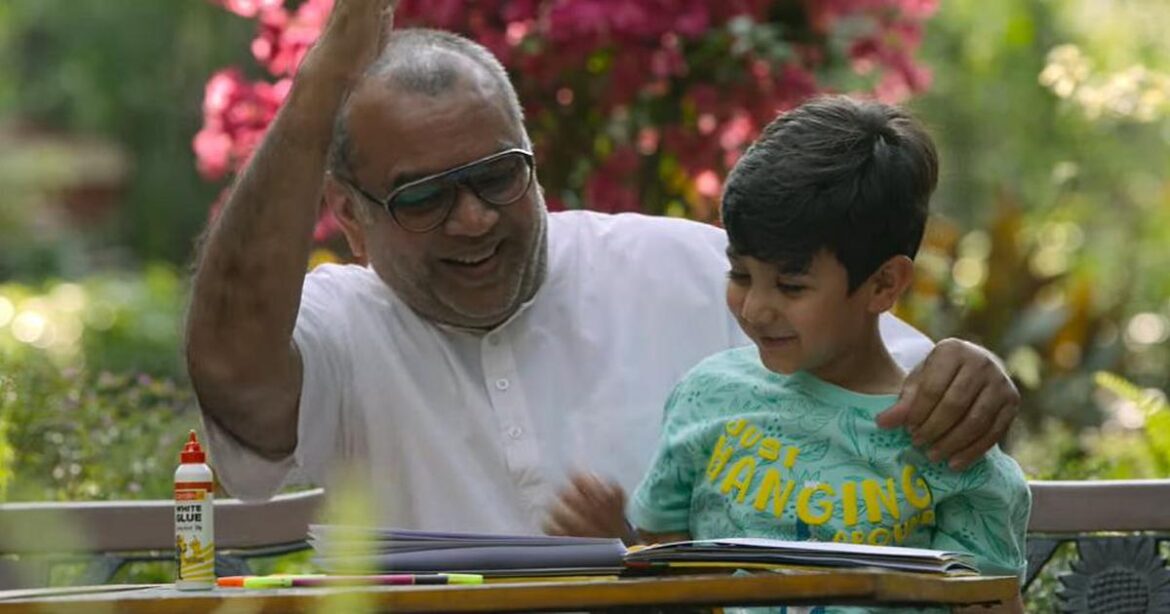Tug Of War:
Successful filmmakers from West Bengal, with a series of hits and some award magnets behind them, Nandita Roy and Shiboprosad Mukherjee, have made a Hindi version of their Bengali hit Posto (2017), perhaps to test the temperature for their kind of cinema in Mumbai.
Shastry Viruddh Shastry has topicality and some pan-Indian casting on its side. In India, every urban working couple relies on grandparents for free and safe childcare.The film takes a Caucasian Chalk Circle kind of conundrum, when a kid becomes a bone of contention between his parents and guardian grandparents.
With their son Yaman ‘Momoji’ (Kabir Pahwa) being cared for in Panchgani by their parents Manohar Shastry (Paresh Rawal playing the role Soumitra Chatterjee did in the original), a music teacher, and his wife Urmila (Neena Kulkarni), Malhar (Shiv Pandit) and his wife (Mimi Chakraborty) are able to pursue their demanding careers in Mumbai for seven years—he as a game designer, she as a collection agent. They visit every other weekend, and find the child healthy and brimming with affection. Mallika does express apprehensions about the excessive pampering of Momoji but is dismissed. There is already some strain in the relationship between Malhar and his father, over unresolved emotional baggage from the past.
Then Malhar quits his job after a showdown with his boss, and decides on being full time dad to Yaman, and take him back to live with them. Later, he gets a dream business offer from a friend, which would mean relocating to the US, and the elder Shastrys do not want to let go of the child and disrupt his comfortable life. There is just a little hint that Yaman, as perceptive as little kids sometimes are, subtly manipulates both couples to his advantage–the coddling by the grandparents (Urmila even brushes his teeth) and guilty gifting by the absentee parents.
Shastry is portrayed as the old-school patriarch, used to having his way, and Malhar’s insistence on taking away his son, leads him to filing a case in court to demand legal guardianship of Yaman. It is in the pro and anti arguments before a bemused judge (KK Raina), that the various lifestyle and attitudinal differences in parenting between two generations are presented, and both sides are balanced in the script (by the directors and Anu Singh Choudhary).
Manohar’s lawyer is his senior citizen friend (Manoj Joshi), who is contemptuous of the younger generation; Malhar is represented by a young, shark-like female (Amruta Subhash), who believes the older generation stifle their children. She is not deferential before Manohar as the young are expected to be, even if the elders are in the wrong. The film presents both sides cogently, and leaves the viewer as confused as the judge about which side to pick. As Mallika says at one point– and this is not given adequate attention– why is the mother’s point of view not even taken into account?
Hindi cinema has either demonized or deified the patriarch—played in a succession of mainstream movies by stars like Amrish Puri and Amitabh Bachchan, both of whom personified the obstinate old man. Shastry Viruddh Shastry, perhaps says that the era of the distant, inflexible father are drawing to an end, but till a workable model for the perfect dad – and the lax Malhar is not it — is created, kids will be tossed around in the whirlwind for a bit and mothers will have to put up with it. Paresh Rawal plays the older Shastry with the air of a man who is just discovering his inner softness after years of glowering his family into submission. There is a stiffness in his manner, but also unexpected tenderness towards Yaman. Shiv Pandit has the tough task of matching up to that intensity, which he manages in a couple of scenes. The film may have stretched the material that did not have substance for 140 minutes, but also makes valid points.
(This piece first appeared in scroll.in)

